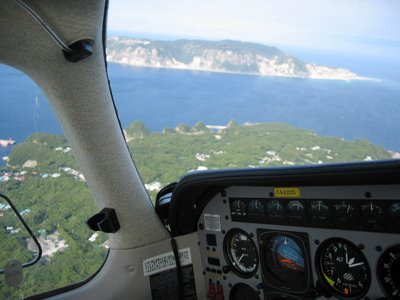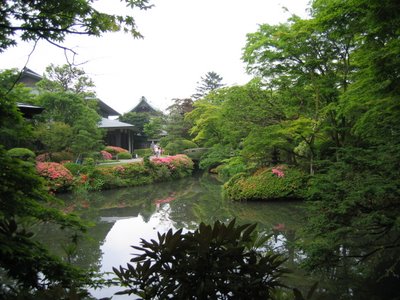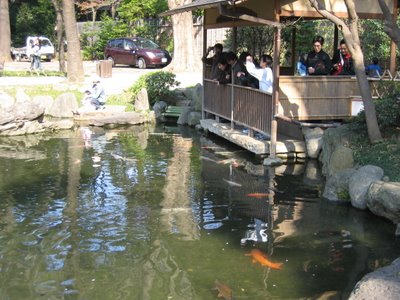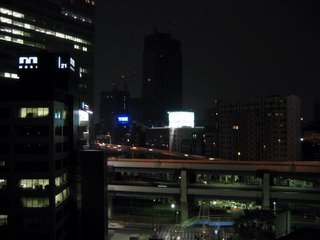A new mainframe professional's modest musings on life, career, travels, politics, and more. The views expressed on this Web site are my own, not my employer's.
Sunday, December 17, 2006
Saturday, December 09, 2006
I Feel the Earth Move Under My Feet
People have strange ideas about risk. Last year IBM asked a distant colleague if he'd travel to Manila on business. He refused, citing the fact that there's a U.S. State Department travel warning concerning the Philippines. IBM cannot force him to go in such circumstances, so management asked if I'd be willing to go. (That's called "risk shopping," I guess.) I said, "Sure, but let me check something first." I found out that this colleague lives in Miami. Using the power of Google, I found the crime and population statistics for metropolitan Miami and Manila. Then I phoned my manager back and said, "You might want to explain that he should pack up immediately and bring his entire family as soon as possible, permanently, to live in Manila. Miami's murder rate is three times higher."
He took the trip.
Tuesday, November 21, 2006
Airborne Connections
Two kids are sitting near me, and they've been quite animated the whole trip. Thus sleep will have to wait. There's a Japanese gentleman sitting one row back, and occasionally, rarely, he visits mom and the kids. He's the father I guess. He sleeps just fine while mom handles the tykes.
This little glimpse into Japanese airborne household life brought to you by Boeing and JAL, live as it happens. I'll order some shochu now. Maybe that'll work. Kids are great, except when they're not your relations.
Hi, KK!
Sunday, November 12, 2006
Democratic Politics
Speaker Nancy Pelosi has a "100 hour" agenda which she promises, and her list isn't bad. If the Democrats are going to pass a minimum wage increase then it ought to be indexed to inflation, but that's a quibble. In the next 100 hours, how about fixing the broken election system? There's a simple fix: adopt Oregon's vote-by-mail system nationally. Does anyone have a cogent, reasoned argument against vote-by-mail? It looks like a great system.
Friday, November 10, 2006
The $5 Haircut
For 180 pesos (about $3.60) you get a haircut including straight razor finishing (sides, back, and around the ears), shampoo, blow dry, and back/shoulder massage. Two people take care of you during the 45 minute process.
I was so impressed I left an extra 70 pesos. Tipping is not required in the Philippines.
Saturday, November 04, 2006
The Japan Airlines Class System
This year is different. I signed up for Japan Mileage Bank (JMB) at the beginning of the year, expecting I would fly Japan Airlines frequently, maybe too frequently. I've steadily moved up the multi-tier JAL class system: Crystal (25,000 miles), Sapphire (50,000 miles), Sapphire plus Japan Global Club, and now Japan Global Club Premier (70,000 miles). By the end of November I will qualify for Diamond (100,000 miles), which means I receive a key to the executive washroom or something.
What an insane amount of flying.
Friday, October 27, 2006
Mooney Over Japan
Thursday, October 26, 2006
Engrish
CANNED BEVERAGE MAKES YOU REFRESH.
WE CAREFULLY DID THE BEST SELECTION.
THEY ARE OUTSTANDING AMONG OTHERS.
Better than my Japanese unfortunately.
Tuesday, October 10, 2006
Tokyo Weather
I don't watch much television at all, especially with this great weather, but I try not to miss Project Runway. What could be better than watching a bunch of neurotic fashion designers try to clothe starving (literally) models with materials scavenged from a dumpster (for example)? Season 3's final episode airs this week, and I'd like to see either Michael or Laura win.
UPDATE: Laura and Michael finished third and fourth, respectively. Now I can concentrate my limited television viewing on Torchwood and Battlestar Galactica.
Thursday, September 28, 2006
Meet Singapore's Idol
Saturday, September 16, 2006
Macintosh Keyboard Questions
Keyboards are still more efficient for many tasks, and I'm trying to adjust.
Thursday, September 14, 2006
Expecting Criminal Indictments at HP
"We currently have sufficient evidence to indict people both within HP as well as contractors on the outside," Lockyer said on PBS's NewsHour with Jim Lehrer. "Crimes have been committed," Lockyer said. "People's identities being taken falsely is a crime. People gaining access to computer records that have personal information, in California, that's a crime."
The Hewlett family needs to come back in and clean house. This behavior is disgraceful.
Sunday, August 27, 2006
Singapore Idol 2006
Sometimes people ask me what I do professionally, and they might ask the question, "What's a mainframe?" Maybe these videos help answer that question. Maybe.
I'm adjusting well to my new MacBook. The keyboard is a bit different, and I'm still trying to figure out the keyboard accelerators to stay productive. The standard memory (512 MB) is a bit on the light side, but it's not too horrible. I've had a couple applications crash, but the operating system itself seems rock solid. Everything I need to do at the office can be done. Keeping the machine clean will be a huge challenge. Anybody have any advice for cleaning a white MacBook?
UPDATE: Hady is in the final
Tuesday, August 08, 2006
MacBook Left Alaska
The help desk people were unable to recover anything from my crashed hard disk, so I am thinking about sending it out to a data recovery specialist just in case there's something on there I might want. Fortunately the important information is replicated (Lotus Notes databases) or backed up, for the most part. Later today I'm going to see if I can recover iTunes from the iPod.
UPDATE: I recovered the vast majority of the iTunes. My MacBook, born in China just a few days ago, is now sitting at the Fedex depot just three blocks from my Chicago apartment. Nice job, Apple.
LATER UPDATE: Fedex knocked on my door in Chicago, and I wasn't home. I'm still in Tokyo. My MacBook beat me to Chicago. Also, the polls are open in Connecticut as I write this update, and here's hoping that Ned Lamont defeats the odious Senator Lieberman. To my friends and family in Connecticut, please remember to vote early and often for Mr. Lamont.
EVEN LATER UPDATE: My MacBook has arrived. Fedex was able to deliver to my building's office. Tonight I fly to Chicago to catch up with it.
EVEN LATER THAN LATER UPDATE: Ned Lamont is now Connecticut's Democratic nominee for the 2006 U.S. Senate election. Thank you, Connecticut.
Sunday, August 06, 2006
Mandarin Smiles
Saturday, August 05, 2006
Limping Along
I pulled the hard drive this morning so that I'm not tempted to work on it any more. I need a specialist to see what data he can pull off. Right now I'm using a bootable Linux CD to get online, yet another reason to like Linux. If there's nothing to save then I'll lose about 11 months of ancillary data. Most of what's important is protected in Lotus Notes replicated databases, though. Notable losses might include recent photos, many iTunes downloads (but they were all the free ones), and a couple spreadsheets I'll miss somewhat.
A more recent backup would have been nice, but I'll live.
I decided to purchase an Apple MacBook, and hopefully the new machine will arrive in about a week. Perhaps it's silly buying one's own machine mostly for office use, but I figure I'll splurge and meet new people who will want to know why there's a Macintosh in the office. Like the newer ThinkPads, the MacBook has a motion sensor which will park the hard disk heads before they crash. Unlike the newer ThinkPads the MacBook has a magnetic power cord attachment, so it is not possible to trip over the cord and send the machine tumbling.
If anyone has MacBook advice, feel free to share. I ordered the basic 1.8 GHz model with a 100 GB hard disk, VGA adapter (for presentations), and a free (after rebate) printer/scanner/copier. Is NeoOffice any good?
UPDATE: Apple shipped the printer but not the computer yet. So I called asking them to upgrade to two-day shipping to Chicago. "I'm sorry, we can't do that." The computer hasn't left, and it may not leave for days, but Apple can't seem to slap a two-day sticker on the box. All of which means I'll need a minor miracle to receive the computer before my flight back to Japan. There's still a chance, but I'm nervous.
LATER UPDATE: Like this consumer, I see that Apple is shipping my MacBook directly from China to Chicago. The good news is that Fedex thinks the MacBook will arrive on August 9, the day I arrive in Chicago. I hope Fedex is correct. Too bad Apple cannot parachute the MacBook into Tokyo before I leave.
Thursday, July 27, 2006
Sunday, July 23, 2006
This Ninja Never Sleeps
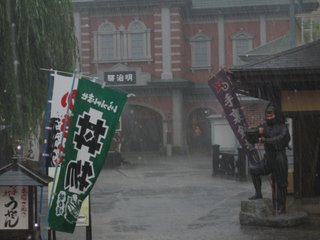
I Stay
UPDATE: Will I stay in Japan or will I live somewhere else in Asia? A little uncertainty surfaced yesterday. Stay tuned, blog readers.
Saturday, July 22, 2006
Bali Hi
Unfortunately Bali is not crowded right now. There's a persistent U.S. State Department travel warning, so lots of Americans avoid the place. (There were several vacationing Germans, however.) My flight appeared to be mostly full when I booked it, but the recent news about another Indonesian tsunami that killed hundreds in Java, not Bali, nonetheless largely emptied the 747 I boarded Tuesday. The hotel was likewise sparsely populated, and right now is supposedly high season.
I think lots of people consider the State Department warnings to have veto authority over their travel plans, but I have a somewhat different outlook. I do read them and take them seriously, and I do not like to take unnecessary risks. However, we all take risks. Crossing the street is risky, for example. As another example, last year I received a call asking if I would be willing to travel to Manila to teach an IBM internal class. One of my colleagues declined because there is a State Department travel warning for the Philippines. I did a little bit of research and determined the number of people in greater Manila who suffered violent death (murders, terrorist or otherwise) over the past few years. I compared that number to the same number for Dade County (Miami), my colleague's home area. I gave greater weight to more recent violence, and I also looked for differences in targeting Americans specifically. (There did not seem to be any particular targeting by nationality in either city.) Then I told him it would probably be a good idea to pack all his belongings and bring his whole family immediately and permanently to Manila because the rate of total death-inducing violent crime was about three times higher in Miami.
He went to Manila to teach the class.
As a side comment, I understand that the 9/11 deaths do not appear in official U.S. crime statistics or airline fatality statistics. Why? They should. Dead is dead.
There's a lesson here for computing. Sometimes staying put — inertia — is the riskiest move of all. That's especially true when your business changes and your information technology doesn't. For instance, in 1981 American Airlines introduced the AAdvantage frequent flyer program. Had Delta, Northwest, and other airlines not responded quickly with their own programs (and significant associated IT changes) they would have suffered grievous financial difficulties. "Our systems are stable, so we don't want to take the risk of changing them in any way" would have led to liquidation in that highly competitive industry. I try to explain this idea to my Japanese colleagues with partial success — many Japanese companies do not yet fully feel the effects of competition in what is still a highly cartelized domestic market. That's not to say that IT organizations should change systems and infrastructure just because there's a new whiz bang technology — that happened a lot in the 1990s — but IT should be highly responsive (or better yet anticipatory) to business needs. Perhaps this argument is obvious, but it is amazing how many IT organizations fail to serve business goals. In many such cases the CEO becomes incredibly frustrated, so he/she outsources the whole IT operation to, among others, IBM.
Saturday, July 01, 2006
Still Looking for These Items
1. Decaffeinated coffee. I like the taste of coffee, and coffee does have newly appreciated health benefits, but the caffeine increasingly bothers me. So I brought a one pound bag of chemical-free Swiss Water Process decaf from Chicago. There are two places I've found that serve a cup of decaf, probably the chemical kind. At the IBM coffee counter you can ask for "mild koh-hee" and you'll get decaf. It's 110 yen for a small cup, so it's a (subsidized?) bargain. Starbucks also serves decaf, although you have to wait several minutes because it's brewed in a decanter, on the spot, since it's an unusual request. There it's about 270 yen for what in the U.S. would be called "short" (a "secret" size in the U.S. that Starbucks sells but doesn't list), the same price as regular coffee. Presumably one could order decaf vanilla latte espresso hazelnut Sumatra mocha (or whatever) and, after considerable confusion, you might get it. I've never tried, primarily because I cannot fathom wrecking the taste of coffee with 16 other ingredients.
2. Unsalted peanuts. Haven't found them. Often the peanuts have MSG. Similar problem locating natural peanut butter.
3. Dried natto. A Japanese product that's hard to find in Japan! Refrigerated dried natto, yes, and it's pricey. Japan Airlines serves dried natto (snack) in business class, and they sell mail order dried natto for about 6000 yen (!) per box. I haven't found JAL-style dried natto in any of the shops yet. I really like dried natto snack, and supposedly it's an amazing health food. It has a wonderful yeasty flavor. There's a U.S. company that started to import dried natto snack, but unfortunately they have suspended orders at present while reorganizing.
4. English-style cider. I found "apple beer" in a restaurant once, but it was simply beer with some apple flavoring. Not even the giant Carrefour in Makuhari stocked hard cider. There's a bar ("pub") close to my apartment that lists a bottle of cider for 900 yen, but they were out during my one disappointing visit.
5. Dark beer. Guiness Stout (which I don't like) is reasonably popular, but a good, dark beer is a little hard to find. One of the Japanese beer companies makes a dark beer — I think it's called "Asahai Dark" — and it's quite good but oddly hard to find. (Asahai is a giant Japanese beer company.) One Japanese restaurant I visited served a 1400 yen boutique Japanese dark beer in a fancy brown bottle, and that was also good but obviously expensive. Carrefour stocked Newcastle, and I think Don Quijote does as well, at about 300 yen per bottle. The average Japanese sushi, yakitori, or other establishment only stocks pale beers.
6. Whole grain bread. Paul, the French-style bakery, has it priced at 400 yen for a small loaf. However, the last two trips they've been out of stock.
Of course there are many Asian products that are difficult to find in the U.S., and I like a lot of those products.
Wednesday, June 28, 2006
U.S. Constitution 1, Insanity 0
There are some new senators we can elect this November, including James Webb, Jon Tester, and Claire McCaskell, among others. Webb has already said he'd vote against this ridiculous amendment if it ever came up again, in agreement with Colin Powell. Not sure about the others yet. I'd really like to see this dumb idea sink well below 50 votes and then disappear for good, and evicting their "yea" vote opponents in Virginia, Montana, and Missouri, respectively, would be a great start.
Along the same lines, could the good people of Connecticut please, please get rid of Joe Lieberman? I voted against Lieberman the one chance I had, in 1988 when I lived in Connecticut. (I preferred Lowell Weicker. Note, please, that this Democrat voted for the Republican in that race — proudly and without hesitation.) Sadly, Lieberman won. However, on August 8th, Lieberman faces Ned Lamont, and if I could I'd vote for Lamont. In recent polls Lamont seems to be pulling even with the country's most obnoxious, sanctimonious senator (Lieberman). One poll had the race at 46% Lieberman to 40% Lamont, 7 point margin of error. Please, any Connecticut readers: please vote for Lamont. Lieberman voted to have the federal government meddle in the private end life affairs of Terry and Michael Schiavo. Lieberman voted for the second Iraq War and still supports it. Lieberman told Connecticut women that it's no problem if you're raped and your local hospital refuses to give you emergency contraception — just get in a taxi and go to another hospital. I could go on.
Lieberman disgusts me. Lamont seems like a decent man, he supports Connecticut's views on a wide range of issues, and he's got political experience as an elected official combined with business acumen. He's also running a great campaign, and, at least from what I can observe, he's serious but with a sense of humor. He certainly doesn't have Lieberman's ego.
Lamont, yes, Lamont.
Thursday, June 22, 2006
Should I Stay or Should I Go?
If anyone has any thoughts on the matter, feel free to post.
Friday, June 16, 2006
Burn the Flag Burning Amendment
Here are some random thoughts and questions that should help illustrate why this amendment is a dumber idea than even Prohibition:
- Does the American Legion want incidents of flag burning to increase? That's surely what will happen if flag burning becomes an act of civil disobedience. Maybe flag burning helps their fundraising? I guess it's much harder to, you know, get better healthcare and pensions for veterans after supporting a presidential candidate who got into office and then cut them.
- What happens when some entrepreneur launches a 24 hour live flag burning TV channel on the Internet, based outside the United States? Will there be a constitutional amendment to shut off the Internet? I can just imagine this channel's program schedule: "Slow Burn," "Stars and Stripes Not Forever," and "These Colors Do Run with Geraldo Rivera."
- If someone burns a flag with 48 stars, does that count? How about 51, to protest the lack of D.C. statehood? How about 14 stripes? How about if the red stripes are not quite Pantone color matched?
- As everybody with half a brain knows, the proper way to dispose of an old, worn out U.S. flag is to burn it. How exactly are the police supposed to distinguish between lawful and unlawful flag burning — whether the person(s) doing the burning have long hair or not?
- Will the police be able to shoot if a suspect holds a cigarette lighter near a U.S. flag and refuses to drop it?
- Will it still be legal to have U.S. flag toilet paper, toilet seats, bikinis, hankerchiefs, underwear, doormats, cow manure shovels, diapers, toothpicks, or condoms?
- Most U.S. flags are manufactured in China. Why shouldn't it be legal to burn Chinese made flags — and at the same time raise lots of domestically manufactured flags — to protest the loss of U.S. manufacturing?
- Why not add some more items to the do-not-burn list that are at least as deserving of respect and honor? How about the Christian cross, the Star of David, and, especially, the U.S. Constitution to start? But why stop there? How about banning the burning of any image depicting the President (except for Bill Clinton), the Vice President, the Secretary of Defense, the Secretary of Agriculture, and the Pope? Should it also be illegal to burn the Bible?
- This morning some bread caught fire inside my toaster. If my apartment or house catches on fire, and a neighbor's U.S. flag gets burned, will I have to defend against another charge of reckless flag burning? If it's just before the 4th of July holiday and the U.S. flag paper plates burn up, will there be a separate count for each plate?
- Will there be a new legal specialty for flag burning cases? Which specific tax should Congress raise to pay for law enforcement?
- What's the penalty going to be for flag burning? If you burn a flag three times, could you get life in prison under "three strikes and you're out" laws?
- If you burn a flag, can you be denied federal student aid? How about SBA loans or, ironically, veterans benefits?
- Is burning a flag, like being gay, cause for military discharge — and a nice, quick way out of Iraq? (Recruits swear to defend the Constitution.)
For the record, I have never burned a U.S. flag. OK, it's possible that I tossed a back issue of National Geographic into a trash incinerator, and that issue may have had a U.S. flag pictured on page 76. But, like all except approximately two wacky Americans, I'd much rather clean my toenails than burn a U.S. flag.
I have a better idea: how about if the U.S. Senate votes against this bad joke 100 to 0, and how about we all simply ignore flag burners? (Are there any?) The only thing flag burners want is attention, and this amendment is the surest way to lavish it on them.
UPDATE: Time to throw the President in jail.
Saturday, May 13, 2006
Weaker U.S. Dollar
A stronger Japanese Yen is actually good news for me. My per diem is set to a fixed yen amount but paid in increasing U.S. dollars. I'm living within the per diem most days, so the minor surplus is a bit larger in dollar terms. Of course family members visiting from the U.S. see the issue differently.
Saturday, April 29, 2006
41700 Yen Pajamas
The Mori Art Museum's curators found some remarkable pieces, and, despite my initial concerns, they handled the war years reasonably well. The exhibit featured paintings, photography, architecture, magazines, books, video, sculpture, furniture, and even mechanical "life forms." There were some pieces I still vividly remember. For example, a large painting ("B-29s") depicted American bombers high overhead, faintly visible, with a huge blue sky all around. There was some hint of disturbance, but mainly the overwhelming feeling of the piece was resignation. Another piece, a sculpture, contained materials from Auschwitz, including hair, what appeared to be dried human skin, and a searchlight. The searchlight, at the bottom of the piece, was pointed at the viewer, suggesting the Holocaust is an ongoing inspection of all humanity.
The one piece that I remember most vividly was Iwami Furusawa's "Demonic Music" (1948), a frightening blood red image of a nuclear explosion. Organ pipes rise from the top of the mushroom cloud, and horrific devils spew from their tops.
Thursday, April 20, 2006
Excellent Raspberry, Hangzhou, Doctor Who
Although I didn't have much time to enjoy the views during a brief trip Monday and Tuesday, I can recommend a visit to Hangzhou, China. A lake dominates the center of Hangzhou with trees, flowers, and other semi-natural beauty ringing the entire lake. Beijing was not what I'd call "beautiful" — although that's not necessarily a criticism — but Hangzhou is different. The pollution was a little less severe, too.
Season 2 of the new Doctor Who started airing this past Saturday on BBC domestic U.K. television. I particularly enjoy the multi-episode story arcs that work so well in genre television. The season's first episode, "New Earth," brings back the Face of Boe and Cassandra in a story about bioethics. This episode also sets up some unresolved plot elements to keep the audience anxious for more. For example, viewers learn the Face of Boe will return once only. Thank you, BBC, for bringing this classic series back under the able stewardship of Russell T. Davies.
Friday, April 14, 2006
Excellent Maple Ice Cream
The ice cream costs just 170 yen, so it's a good value in quality junk food. The optional caramel swirl is another 30 yen, and that's good, too. But the sheer entertainment value of Japanese Surfer Dude is worth at least 400 yen. Yesterday, when I ordered some of the good stuff, I happened to say "Excellent" as I received an extra large dose. JSD, in his best Bill & Ted's Excellent Adventure style, stuck his thumbs up and out and vigorously echoed, "EXCELLENT!"
JSD really enjoys his job. Customer service employees almost universally do in this service-oriented society. I know the feeling.
Tuesday, April 11, 2006
Go Big Blue!
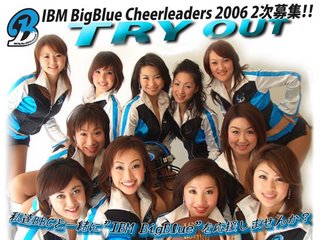 IBM Japan sponsors a professional rugby team, an American-style football team (with a lovely IBM Big Blue cheerleading squad), and even the IBM Philharmonic Orchestra.
IBM Japan sponsors a professional rugby team, an American-style football team (with a lovely IBM Big Blue cheerleading squad), and even the IBM Philharmonic Orchestra.I guess it's further proof that IBM is both the largest and most diversified information technology company in the world. And if the sales representatives need more enthusiasm after a disappointing quarter, we've got cheerleaders!
The Earth Shook
As it happens I was having a conversation with an IBM technical specialist about risk, to put it simply. We had different opinions about how to manage risk in a specific customer situation, but I think we came to a tentative agreement after the earthquake.
Sunday, April 09, 2006
Tuesday, April 04, 2006
Cherry Blossoms & Bangkok
Last week I flew to Bangkok to meet with a major transportation-related company, and the meetings went well. While I was there the opposition parties launched several protests against the current government. The opposition parties asked their supporters to effectively vote "present" in the election on April 2, and they managed to significantly reduce the government's vote totals according to early results. Opposition forces demand the resignation of Thailand's prime minister for alleged corruption. The opposition had a great idea, I thought: use an upscale Bangkok shopping mall as their protest forum. The mall is quite comfortable, has plenty of restrooms, climate control and shelter, and it helps capture their criticism of the PM who also happens to be Thailand's wealthiest man and one of the few Thai who can shop at the fancy mall.
Thailand's newspapers were full of dire warnings about how the protests would disrupt life as we know it, but of course they were perfectly peaceful, and Bangkok's relatively new public transportation system kept the city moving even when the car traffic wasn't. My guess is that Thai newspaper barons like to sell newspapers.
Tuesday, March 21, 2006
Leaving Chicago, Malaysia Photos

In about 20 minutes I leave Chicago to go back to Tokyo. It's frankly crazy to fly all this way only to stay for less than three days, but at least I voted this morning for Debra Shore for Commissioner of the Metropolitan Water Reclamation District. I know Debra as a fellow volunteer during the 2004 Iowa Democratic Caucuses, and I think she'll do a great job.
Photos delayed but certainly not forgotten. The view from Starbucks KLCC (top) and the view from the 50th floor of Petronas Tower.
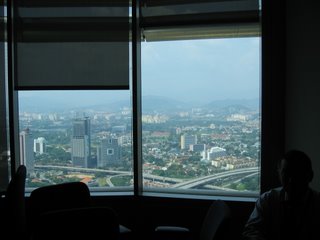
UPDATE: Debra Shore appears to have run a strong second in her primary election. She had to finish in the top three to win one of the three vacancies, so she won and will serve as one of the next MWRD commissioners.
Sunday, March 19, 2006
Chicago & Basketball
Let it be noted that American Airlines is vastly inferior to JAL, Korean, ANA, Cathay Pacific, or just about any other Asian airline. The major reason is that AA's flight attendants are not particularly service-oriented and certainly not empathetic, as a rule. Unfortunately it's also true that many American (the nationality) passengers are rude, so the feedback loop reinforces negatively.
Fly JAL in business class and you'll see almost everyone neatly attired ("business casual"), serene, and polite. Passengers and flight attendants cooperate to keep the restrooms immaculate. If you glance in a flight attendant's direction — and they are always within glance range — your eyes are more than enough to let them know you have a request. Fly AA in business class and you'll see half the cabin in t-shirts and sweatpants. You cannot board because everyone who hasn't been called clusters in front of the gate, blocking access. The flight attendants disappear for long periods, and most are surly.
At this instant I'm ranked #4 in the office NCAA basketball bracket. However, I picked Iowa, Michigan State, Syracuse, and Illinois to advance much farther, and all are now out of the tournament. I think Connecticut will win the whole deal, but their first game was unsteady.
Monday, March 13, 2006
Kuala Lumpur Arrival
Photos to follow. For this quick report I'm using the free WiFi at Starbucks in the Petronas Towers — the twin towers that officially but oh-so-controversially dethroned Chicago's Sears Tower as the "world's tallest."
Sunday, March 05, 2006
Name That Fruit
Turns out they're frozen lychees. The white flesh, inside a husk and surrounding a pit, is the only edible part. They have a subtle sweet and fragrant taste. Lychees are chock full of Vitamin C and potassium, supposedly.
I spent a good part of today walking around Chinatown in Yokohama. I bought a bag of roasted chestnuts (200 grams for 525 yen), and lunch was fantastic — as it should be for 3000 yen per person.
Looking Out the Window
Friday, March 03, 2006
Twinkle, Twinkle
I suppose this music beats Barry Manilow and Olivia Newton-John. Except maybe the Grease soundtrack.
Tuesday, February 28, 2006
Beijing Blogger Blocking
It's hard to summarize the trip, but here's a stab:
1. Dirt. After spotless Tokyo it's quite a shock. I'm used to dirty streets and buildings, but the polluted air really bothered me. I wonder if the 2008 Olympians will need respirators.
2. Cheap! You're shopping at Wal-Mart's Wal-Mart. I didn't haggle well and probably paid triple what I should have for a coat, but I still did well. The Carrefour (no haggling required) was amazing.
3. Huge business opportunities. China has business computing problems that only mainframes can solve. The forecasted transaction volumes for many of these businesses are enormous. I visited one customer that will probably be running 50,000 per second within five years. (Yes, we can do it even today. Nobody else can.)
4. Growth. Everywhere you turn there's a construction crane. Workers are slapping up buildings as fast as they possibly can. I visited another customer that moved into its offices two weeks ago, and workers were still trying to finish up the inside of the building.
5. Government. I had interactions (directly or indirectly) with five Chinese businesses. All five are owned, partially or fully, by the Government. The state as the ultimate capitalist!
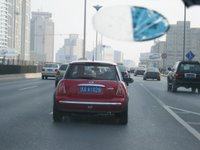 6. Traffic. I read in China Daily that every day there are 1,000 more cars added to Beijing's already crowded streets. Mix with bicycles, buses, motorscooters, pedestrians, carts, and several other ways of getting around and you've got a deadly mess. There are no rules of the road. I heard lots of stories (which I believe) about awful car crashes with lots of carnage. "Life is cheap here," said one outsider.
6. Traffic. I read in China Daily that every day there are 1,000 more cars added to Beijing's already crowded streets. Mix with bicycles, buses, motorscooters, pedestrians, carts, and several other ways of getting around and you've got a deadly mess. There are no rules of the road. I heard lots of stories (which I believe) about awful car crashes with lots of carnage. "Life is cheap here," said one outsider.The whole place is probably like Chicago was in the mid-1800s, or California during the 1849 Gold Rush. The boom is in full overdrive. Let's hope China doesn't repeat the same mistakes.
Monday, February 20, 2006
Chicken Breath
Yesterday I actually visited the health club. I'll be back. Tomorrow morning? I also reaffirmed my appreciation for the Hanamasa chain of grocery stores. Hanamasa sells in "bulk" and started as a restaurant supply company, but anyone can shop there, and the stores are open at any hour. Japan's bulk sizes would be standard U.S. sizes, so as long as you've got a decent sized refrigerator it's a good place to stock up. Hanamasa has lots of discount frozen foods. I got a half kilo of frozen strawberries for 199 yen, for example.
Chicken prices are a bit strange. Breasts are one of the least expensive parts: around 45 yen per 100 grams at Hanamasa. Thighs and wings cost more oddly enough. Maybe that's because expats spend 4250 per person eating them from skewers. [Insert your own joke here about cheap breasts.]
It's confirmed. I'm leaving for Beijing on Wednesday. Unfortunately I could only obtain a single entry visa at the Chinese Embassy because I had a faxed copy of my invitation letter, so I get to stand in line again next time after I receive the original. I probably don't have to deal with visas since somebody at the office could handle the whole process, but the Chinese Embassy is an easy walk from home, and it's one more way to experience life.
Saturday, February 18, 2006
On the Hot Seat
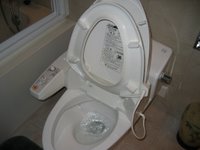
Mainframes may be newer in Europe and the United States, but Japan's bathroom fixtures outclass all others in modernity.
When I moved into my apartment I shut off the heated seat, thinking the whole idea absurd. A few days later I turned it back on, thinking I should try to embrace cultural phenomena. This morning I thought, "Maybe this idea makes sense." At this rate, in about two weeks, what started as a ridiculous feature may become as necessary as toothpaste.... OK, maybe not.
Given the electricity required to heat Japan's seats, how many tons of greenhouse gases do they produce each year? (Will local warming result in global warming?) And has anyone in Japan ever been commodiously electrocuted? If someone in this blog's home audience wants to offer some answers, post a comment.
Friday, February 17, 2006
The Alien Has Landed
This week I got at least tentative requests to visit China, Taiwan, and Indonesia. We shall see what happens. I received an invitation letter from our Beijing office, so I can apply for a visa on Monday.
Sunday, February 12, 2006
Tilting at Windmills
I found several battery powered alarm clocks at Quijote, but with such big numbers (980 yen and up) I had to ponder the purchase a little more, so I left them all on the shelf. Then I realized that I live in an apartment that costs more to keep than an airplane, so why don't I take the one broken item I inherited in this apartment (the alarm clock) to the front desk to see if they'd replace it? Surely they can afford the luxury ~1900 yen model.
I received my first complaint about this blog: an expat in Norway (paying bills in Kroner) finds it difficult to decipher the yen prices I post. After considering this complaint for many
Sorry, no Tokyo nightlife reports yet except second hand ones. No, I really can't post what I overheard those two blokes saying too loudly. In the meantime, check out blogs here and here if you want stories. See if you can find the single sheet "language guide" at the second blog. I laughed.
Wednesday, February 08, 2006
Old and Getting Older
Several days ago I mentioned that it's harmful to your business if you allow your IT infrastructure, including your mainframe, to deteriorate. Inertia can often be the most costly decision of all. One simple situation that everyone can understand is if a person is bleeding. Of course that person would seek a doctor immediately, understanding there will be costs. But the costs of inaction are far more dire: death is much more expensive.
The analogy is imperfect but valid. Let your mainframe age too much — get behind in your upgrades, hang onto old hardware too long, rely on unsupported middleware — and your business will suffer. You will pay more for software, maintenance, and support (if you can get it) every month. You will buy demonstrably more expensive computing solutions as your businesspeople desperately try to deliver new function, bypassing what you've neglected. You will bleed talented employees who will leave to work for a more progressive company. You will compete against businesses who have better technology and thus superior business functionality. You will actually experience more planned and unplanned outages with longer recovery times — newer hardware and software have substantial improvements in those areas. And you will risk compromising your customers' privacy because newer systems have better encryption facilities than older systems. Already one corporation which couldn't protect customers' privacy went out of business.
I guess it's no secret that the most technologically advanced industrialized country in the world, Japan, is struggling with this issue of aging IT infrastructure spectacularly and uniquely.
SOA (Service Oriented Architecture) is part of the answer. SOA fosters reuse of IT assets so that your technical infrastructure can respond much more quickly and easily to changing business demands. It's also one of the few ways businesses and governments will be able to reduce their IT expenses over the long term while actually improving their capabilities. SOAs will only be successful if the mainframe provides services (the S in SOA) and hosts at least the major part of the Enterprise Service Bus (ESB). (The ESB is the core foundation of any moderately sized SOA.) Quite simply, if your mainframe is not the key ingredient in your SOA then you really don't have an SOA strategy.
Mainframes are as youthful as you want them to be, and they deliver the highest qualities of service for the lowest total costs per transaction. SOA means you can exploit your mainframe's abilities for maximum business advantage. You can bet at least one of your competitors has already figured out these facts.
Monday, February 06, 2006
Chicken Soup
I took the chicken soup broth and added what little chicken I could salvage, tofu cubes, a can of tomatoes, some mustard greens, a little rice, bean sprouts, straw mushrooms, and leeks. If you ever have to cook something, try soup. Just look around and toss random ingredients into the pot. It's hard to screw up soup, although I suppose it's possible. This soup is exceptionally tasty, and I even managed to add the sprouts and mushrooms at the last minute.
Sunday, February 05, 2006
Sticker Shocked
My favorite grocery store so far is the Pororoca store, and that's not just because there's an English pub next door. They had lots of sale items including some vegetables priced below the 100 yen barrier. I got a fairly large leek for 58 yen, 200 grams of straw mushrooms for 98 yen, and a package of bean sprouts for 58 yen. Pororoca has a laundry on site, and their shirt prices are a bit lower than the Ark Towers delivery service. Nissin had a small double package of mustard greens ("day old") for 105 yen, and I also found a roughly one pound package of chicken for 164 yen. I thought the chicken was a great deal until I got home and discovered it was just leftovers for soup stock, so I made (expensive) soup.
A block of tofu seems to be 89 yen predictably. Canned tomatoes aren't too far out of line (about 85 yen per can at Costco), and Pororoca had a large can of mandarin oranges for 100 yen. Beef is ridiculous, especially now with the embargo on U.S. beef. Spices are pricey, but I found a packet of chili powder for 71 yen and a bottle of minced ginger for around 330 yen.
After studying the rough English translation of the washer and dryer manuals, I did a couple loads of laundry. My office compatriots will appreciate my breakthrough in fabric management.
Tonight I went to church. There are a few Catholic churches in Tokyo, and one of them is a ten minute walk from my apartment. There are five weekend masses in English including the 6:00 p.m. mass. This mass was a bit somber: last night one of the parish priests died after a long illness. There were a couple other unusual aspects to the mass. Parishioners could submit personal intentions to be read aloud, and one of them requested prayers for a successful visa application. Also, a karaoke machine (or something sounding like it) produced nearly all the instrumental accompaniment.
Thursday, February 02, 2006
Sake Nights
I had a productive day at the office on balance, although the last meeting was a little tense. We identified potential customers for some new offerings, and I feel hopeful that we will actually be able to help these customers.
Then tonight we had a party to celebrate the promotion of a senior manager here in Japan. This event does not happen every day, so I was fortunate to be a new member of the organization to watch it happen. While all the workers knew about the promotion, the manager only found out at the surprise party this evening. (That's exactly the reverse of IBM practice in the United States. I think I prefer the Japanese approach — this manager was genuinely moved by the event.) Again, lots of laughs, conversation, and this manager even took the karoke microphone to sing.
These drinking events can drain the wallet quickly. One of the visiting managers settled last night's bill, but tonight each IBMer paid 8000 yen to join the celebration.
Tonight the team surprised me with news that a potential brand new customer has approached IBM to inquire about our capabilities. This news will keep me occupied probably for the duration of my assignment. Did I mention that more business gets done after 8:00 p.m. in Tokyo than during "regular" work hours?
Wednesday, February 01, 2006
Almost No Longer Homeless
The third building was the Oakwood Apartments in the middle of Rappongi, but the building management couldn't actually show me the exact unit I'd be renting. Oakwood is a worldwide chain of corporate housing, and a franchise just didn't seem right.
That left the second building, Ark Towers near the IBM Asia-Pacific Headquarters. Unfortunately I work in the other IBM office, but Ark Towers has a great health club which I can feel guilty about not using. I also liked having windows on two walls in the bedroom. (I need light to wake up sometimes.) Ark Towers and the Oakwood Apartments are perhaps more "luxury gaijin ghetto" than the first building, but there's something to be said for having a few people to talk to about the Superbowl and just how bad George W. Bush is.
I spent some time between each appointment walking around each building's immediate neighborhood trying to get a sense of the place. For example, I sat for a little while in the Starbucks near the Ark Towers. Two British blokes were chatting about their sexual conquests and how they cheated on their girlfriends. How disgusting.
When I got back to work at the IBM office later that afternoon I called the relocation agent to ask for the Ark Towers.
Monday, January 30, 2006
Coffee Jelly, Mexican, Akihabara, Department Store
My boss, his wife, and I spent the better part of Sunday in Akihabara, Tokyo's electronics district. There are few bargains, but there are some unique gadgets available, including high-tech toilets with more buttons than my dress shirt. I was mainly interested in finding a mobile phone, but since I'm only scheduled for six months in Tokyo it didn't make sense to get a contract with Willcom, NTT DoCoMo, KDDI, or Vodafone. Vodafone and KDDI offer prepaid phones, but apparently only the companies' own stores sell them, so I'll have to make a special trip. I think I also might need a resident alien registration card in order to buy a mobile phone, and I can't get that until I move from the hotel to an apartment. Mobile phone rates tend to be expensive, but at least incoming calls are free (because the caller pays).
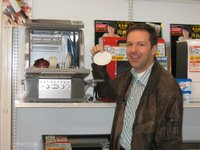 The most puzzling gadget I found was a tiny dishwasher that can handle perhaps five teacups and saucers. What's the point? Wouldn't it be trivially easy to hand wash that small number of dishes?
The most puzzling gadget I found was a tiny dishwasher that can handle perhaps five teacups and saucers. What's the point? Wouldn't it be trivially easy to hand wash that small number of dishes?Sunday night we dined at Fonda de la Madrugada, an excellent Mexican restaurant (best in Tokyo, supposedly). The watercress salad had too much dressing for my tastes, but the lentil soup was sublime.
On Monday I was back in the office around 8:30 a.m., and I (finally!) had soba (buckwheat noodles) with vegetables in a miso (soy) broth for lunch. Lunch was a bargain: about $3.75 for the noodles, a hunk of tempura vegetables, and something resembling cherry Italian ice. I had lunch with a senior IBM manager (one of the corner office people), and we talked a bit about his visits to Connecticut, the same state where I grew up. During the afternoon I arranged for three apartment visits tomorrow (Tuesday, January 31st). I also spoke at length with many of the technical staff, including my direct counterpart (a mainframe software architect). We talked especially about scheduling architectural workshops with some of our customers.
On the way home I visited the lowest floor in the Mitsukoshi department store. That's where they sell gourmet food, and it's wonderful. I bought a loaf of French onion bread for about 230 yen. Every counter is immaculate with all the food items beautifully displayed. For special occasions I'll be sure to return.
Saturday, January 28, 2006
Not a Casual Friday. Walking on Saturday.
Somebody decided I should get a manager's desk along the edge of the cubicle area. I went from no walls to three walls, and I now face most of the mainframe software staff. My office assistant introduced herself, too, and....
Wait a minute! I have an office assistant? (An undetermined share of one, anyway.) A desk on the edge of the room where I look onto the mainframe software technical staff? Somebody's singing the theme song to TV's "The Jeffersons." Nah, there's no pressure — none at all.
Today I decided to walk all over the place, and I chose two neighborhoods: the area around Harajuku Station and my hotel's neighborhood. JapanGuide.com suggested my first target would be full of Japanese teenagers and interesting shops, and it was. I observed what looked like the shooting of a TV soap opera scene: the young actor walked out of a restaurant storefront with a menu placard, positioned it on a stand outside, admired his efforts briefly, then turned toward the camera and gazed skyward, pondering something. The director yelled the Japanese word for "Cut!" I assume, and two production assistants rushed toward the actor, one with a coat to prevent the actor from suffering a moment's extra cold air, and the other with a water spray bottle and a brush to adjust his hair. I couldn't really tell the difference between hair before and hair after, however.
I spent a lot of time in a discount book and music store browsing the sale items, but ultimately I decided I didn't need the 1997 Eagle Eye Cherry CD I discovered, even for 250 yen (assuming I could find one other CD to get the discount — that "Rico Suave" guy's CD could have worked in some alternate universe). I passed by a store called Condomania that sells you-know-what. Looks like Japanese teenagers have ready, nonjudgmental access to STD protection. Great idea.
My hotel is right next to a shrine. I simply couldn't figure it out, so there's not much I can say about it except that it was a beautiful and peaceful oasis. If anyone knows why roosters live at the shrine feel free to post a comment.
Is Tokyo Expensive?
 Here's a chicken sandwich, vegetable salad, and a pint of 100% grapefruit juice from 7-11. So how much did this fresh and tasty meal cost? $15? $20? $40? Actually, it cost just a little over $4. Which leads me to conclude provisionally that Tokyo isn't terribly expensive, contrary to popular belief ("most expensive city in the world") — or at least that high costs are mostly avoidable.
Here's a chicken sandwich, vegetable salad, and a pint of 100% grapefruit juice from 7-11. So how much did this fresh and tasty meal cost? $15? $20? $40? Actually, it cost just a little over $4. Which leads me to conclude provisionally that Tokyo isn't terribly expensive, contrary to popular belief ("most expensive city in the world") — or at least that high costs are mostly avoidable.That said, there are wide variations in price, and some items are much more expensive here than in the United States. (Some are less, notably lunch items.) For example, dine at a fancy hotel or restaurant and the sky's the limit, especially if you see lots of company men on expense accounts. Here's a list of some prices I've seen (in yen):
Subway (one-way, short trip with transfer, no commuter pass): 160
TGI Friday's draft beer (medium size, about 12 ounces): 650
Apple (one) from a grocery store: 98
Cup of tea at a coffee shop: 180
Potato patty sandwich at a coffee shop: 230
Curried rice entree at IBM cafeteria: 250
Bag of unknown salad greens (looked like watercress, tasted like clover, about 8 ounces): 100
80s and 90s music CDs (extensive sale rack) from Book Off: 2 for 500
Japanese books (all) at Book Off: 105
Grilled chicken skewers over rice at TGI Friday's: 865
Aquafresh toothpaste (regular size, about 6 ounces): 148
Whole grain (brown) rice (5 kilos) from grocery store: 1270
Bag of muesli (standard size) from grocery store: 900
Multi-course lunch at Indian restaurant: 1000
Not too bad, really. Fresh fruits and vegetables are indeed expensive, at least when purchased from a grocery store. In fact, most grocery store items seem expensive. On the other hand, dining out can be extremely affordable, especially if you like noodle bowls and rice dishes. Note that there is no tipping in Japan, and the posted prices include all taxes.
Housing is reportedly quite expensive, although fortunately I will never see that bill. Oddly enough, hotels can be quite affordable. Cars are expensive to purchase and operate, but you don't need them. My guess is that most people come out ahead with subways and trains versus paying even U.S. rates for car loans, insurance, and gasoline. Clothing seems reasonable, although there are plenty of ultra high-end brands if you want expensive clothes.
Thursday, January 26, 2006
First 24 Hours
We rode the Ginza subway line to get there. That experience was a minor confidence builder because it's pretty simple to navigate. Each station has a letter and a number. For example, the Capitol Tokyu is at station G06 (Ginza station #6). Subway lines are also color coded, and most signs are bilingual. Each exit is numbered, and the exit-related signage lists major buildings, such as IBM's (at Z10). I bought a 1,000 yen fare card, and, like Washington, D.C., you use the card both to enter and to exit the system. I think London is similar. Fares are based on distance traveled, but all the rides so far are just 160 yen each way, including the transfer between two lines. Riders jam themselves into the cars during rush hour, so it can get tight and pretty stuffy — buildings and trains seem all overheated by American standards. Piece of cake, really.
This morning we had an "all hands" meeting and, in contrast to IBM Americas, practically everyone works in the branch office and so there was a large auditorium full of suits. Two younger employees (one male, one female) had the honor of announcing each executive speaker. The Japanese are extremely punctual, and the speakers did a respectable job sticking to the published times. Each speaker followed a standard introductory greeting, with the audience responding in unison (with gusto). Most of the meeting was verbalized in Japanese, so I didn't understand too much, but most of the charts had English text. My manager lead the closing clap exercise: everybody stood up, and, after some Japanese phrase (which again I didn't understand), everybody clapped once in perfect unison (after one or two rehearsals). I guess I'm learning how to become a "company man."

The branch office is extremely hierarchical. Worker bees have open cubicles in the center of the floor area. Supervisors have larger work desks on the edges near the doors. General managers and vice presidents get the walled corner offices with assistants sitting close by. Today most people seemed to arrive around 9:00 or 9:30. Most people left around 8:00 p.m., but there were several who stayed at least until 9:30 p.m. More on that in a moment. I seem to be classified as a senior worker bee — or maybe just an oddball case.
I attended a series of meetings today, but the longest was an internal sales forecasting meeting. It's not normally my sort of meeting — I'm not a software sales representative (SSR) — but today's was fascinating. This sales team had a bad day, quite simply, because they just didn't have as much information as they should have about their potential customers. Software SSRs aren't at all happy about how the client teams seem to act as rigid gatekeepers with customers, although I've heard that one lots of times. The second half of the forecast review meeting will be tomorrow, so I'll be curious to see whether they do a better job.
In the meeting we discussed one customer that's so backlevel in their mainframe software versions that any updates would still not get them much support. IBM takes a good long time to drop support for older mainframe software versions, but this customer is in really rough shape. Please, please, don't do what this customer did! Mainframe applications — at least the well-designed ones — age gracefully. Middleware and operating systems do not age as gracefully. You have to stay "reasonably" current, otherwise it hurts your own business (or government agency). I'm sure I'll be elaborating on this point in future entries to explain why, but a variety of problems surface when you allow mainframe infrastructure to get too far behind. It's just basic maintenance, like changing your car's oil periodically.
I know many of the SSRs stayed up late tonight. I stayed until 9:30 p.m. trying unsuccessfully to get my computer to print to a strange Japanese printer, and I noticed that most of the zSeries SSRs also stayed while most other people had left. My theory is they stayed because I did. Ooops. I hope it was just because their manager deftly chewed them out.
Bon Voyage
My manager sent me an eight page document containing common Japanese words and phrases and their English equivalents. Oddly “thank you” is missing, so I have some research to do. I have a few words memorized: soba, odon, ramen, Tokyo, sushi, sashimi, sake, sayonara, origami, Godzilla, and konichiwa. So basically I have the vocabulary of a young, alcoholic Japanese toddler.
Yes, I'm in business class, but who knew it would stretch back into row 40 and beyond? However, the most important aspect of any flight is service. It's amazing what a simple smile can do. The three lunch choices included two “Western” variations (steak and fish) or the Japanese set menu. I decided to start with the Western fillet of sole and then graduate to the Japanese dinner later on. I almost went for the “Squid Julienne 'Sashimi' Style” — that'd be raw squid. Almost.
My disembarkation form asks, “How much money in cash do you presently have in your possession?” In the age of yen-yielding ATMs I felt like writing “Not very much, thank you,” but I dutifully reported my vast $172 fortune.
I'll be meeting a slew of managers instantly upon arrival. (Several of them are in Tokyo this week.) We shall see if it is possible to turn a 3:45 p.m. scheduled Narita arrival into a 7:00 p.m. dinner appointment. I have my doubts.
Good night for now. Or good morning. Or... whatever.
